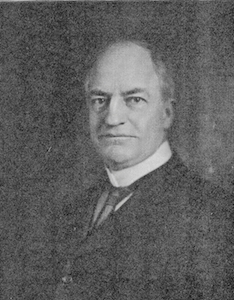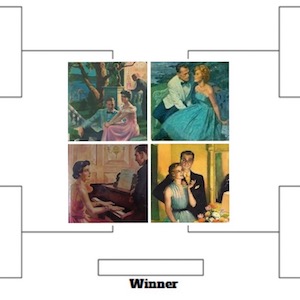Emilie Loring inscribed a copy of Beckoning Trails:
“To Mary and Selden Loring.
This makes twenty-seven down and three to go.
Emilie Loring”

An even thirty. I can relate to this. When I was deciding when to retire from college teaching, setting a date seemed so arbitrary. How many years would I teach? I decided to go for a good, round number, the same as Emilie Loring: thirty.
But why stop there? Did she set the goal of thirty to go on to something else? Or did she set the goal to keep herself going?
Victor Loring was eight years older than she and had heart disease. Before his eighty-seventh birthday in 1946, while Emilie was writing Bright Skies, they began to put their affairs in order.
Emilie assigned all of her titles previously published with the Penn Publishing Company–The Trail of Conflict through We Ride the Gale–to Little, Brown. She retained copyright, and a provision returned all rights to her, should the books ever go out of print.
In September, Emilie went up to her Stone House in Blue Hill, Maine and met with several members of the Kollegewidgwok Yacht Club who were interested in buying the Loring’s granite wharf for their new headquarters.

Victor had a special interest in helping out the yacht club, because his older brother, Charles, and a number of his closest friends had figured prominently in yachting circles. And with the death of Minnie Owen the previous spring, all of the Lorings closest friends in Blue Hill were gone; that chapter had ended.
…not a soul among the entire club membership had ever set eyes on [Emilie Loring] to the best of their knowledge… She turned out to be a delightful person, so sympathetic to the cause that she offered the quarry property for a ridiculously modest figure.
There and then, in her own charming living room, she was voted a lifetime honorary member of the new yacht club in the making.

That seems to have been the last time she went up to Stone House. Victor died in February, 1947, while Emilie was finishing Beckoning Trails.
“Before my husband died I was able to provide professional care for him.”
“I admired him, his money meant nothing. I was earning plenty myself, but, we enjoyed the same things, he was enormously proud of what I had accomplished. We were great companions, and Debby, in the last analysis, the good companion is what counts most in marriage.”
Beckoning Trails
Her parents, sister, brother, many friends, and now, her husband, had died. She was eighty years old herself; of course she considered her age and her own mortality. But she had a longtime conviction about them.
“I’ve observed that the man or woman with a big interest in life never is age-conscious. They are too busy to count passing years”
“I don’t like that word ‘eventually,’ it has a gruesome sound. Here’s hoping it is a long way ahead. I have plots for ten more novels at least before I sign off.”
Beckoning Trails was published in November, 1947, and I wonder what discussion they’d had that trimmed ten novels down to the four she mentioned in her inscription for Mary and Selden. Had something changed, or did she, like me, just settle on thirty as a good, round number?
Like a performer on a farewell tour, Emilie Loring’s “final four” went back to her familiar settings: Wellesley Hills for Beckoning Trails, the Maine coast (Ogunquit) for I Hear Adventure Calling, Washington, D.C. for Love Came Laughing By, and a hybrid of Blue Hill and York, Maine, for To Love and to Honor.
 Calling them her “Final Four” really is a little like the NCAA basketball tournament. Excellence is distributed throughout the bracket–or reading list, in this case–and the last four are really good, demonstrably among the best. It’s clear she put her full heart into them, each a worthy “last,” should it turn out that way.
Calling them her “Final Four” really is a little like the NCAA basketball tournament. Excellence is distributed throughout the bracket–or reading list, in this case–and the last four are really good, demonstrably among the best. It’s clear she put her full heart into them, each a worthy “last,” should it turn out that way.
In July, 1950, Emilie Loring finished To Love and to Honor, but she didn’t stop. On to ten! She signed a contract for her next book, to be delivered by June 1951.
That didn’t happen. Her health failing, Emilie moved in with her son Robert at their old house in Wellesley Hills. She wore a nice dress every day, enjoyed her afternoon tea, and kept writing until her death on March 13, 1951.
“Something tells me that our internationally famous author had this finale plotted last September.” Beckoning Trails




I have a stash of my vintage Lorings and have been re-reading some in the last few months. I know the Ogunquit and York areas of Maine a bit, so I’ll get the titles set there out to read next.
LikeLike
Thanks for the encouragement! My dream was always to meet Tasha Tudor!
Loved the wildness of her gardens but alas, I have no access to goat manure!
LikeLiked by 1 person
There’s actually a Tasha Tudor/Loring connection via her father, Starling Burgess.
LikeLike
Wow! Anticipating your completed book even more!
I wonder if Emilie & Tasha ever met?
LikeLiked by 1 person
That’s something I don’t know. Their circles overlapped, but I have no direct evidence.
LikeLike
Do you know the year Victor & Emilie married? I have tried Ancestry.com but
have had no success. Thanx!
LikeLiked by 1 person
December 9, 1891 in Boston
LikeLike
Thanks Patti for the date! Continuing to create plaques & needed that date.
Visualizing our future gardens is aided me in not dwelling on what is happening
overseas. Flurries here again! The poor robins.
LikeLiked by 1 person
I’m sitting by a crystal-clear lake, sparkling with morning sunshine. Send your robins on down!
LikeLike
Victor must have been her great champion and proud of all she accomplished.
Love shared is loved multiplied. Sorry to know these posts may soon end!
Would you know the year Victor & Emilie married? Working on a special plaque
for my Emilie garden(s) Lovely post! Amazing how much she has influence my life!
So thankful I found you all last year! Blessings! Ellen J.
LikeLiked by 1 person
Yes, it seems that Victor and Emilie had a true partnership. We are getting to the end of the first-thirty list, and I’m saving content for you to read in the book when it comes out, but there’s still plenty to write about. We’ll keep meeting here until the book is published and been out awhile. I’m glad to have met you, too. You’re the inspirational engine behind our Emilie gardens and tea. 😊
LikeLike
I am afraid I will let you down on the heritage roses! I am not having
any success in that department! My hubby is just thrilled with all OUR
garden endeavours this year! ha! I have been accused of being a catalyst
in my community for years! Thank you Emilie!
LikeLiked by 1 person
I’m a catalyst type, too. I like making things happen! I’m starting nearly from scratch with my gardens, so it will be nip and tuck… but remember Vita Sackville-West: “Still, no gardener would be a gardener, if he did not live in hope.” 🙂
LikeLike
Such an interesting post. Emilie’s books have such a strong place in my heart.
LikeLiked by 1 person
Thanks. Emilie sure did her bit of good in the world. Three generations later, she’s still inspiring.
LikeLike